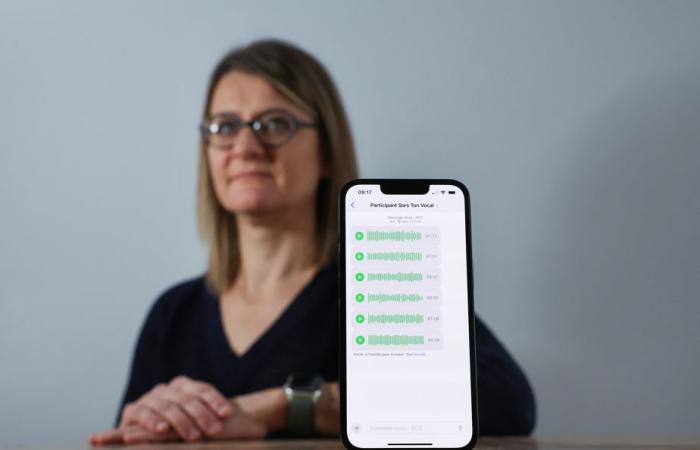Say “voice messages” and watch the people around you lose their temper. Between “I hate this!” » and “it’s so practical!” », this form of communication which is beginning to impose itself divides. Anne-Sophie Bally wants to collect and listen to hundreds of these messages.
Published at 5:00 a.m.
The professor in the department of letters and social communication at the University of Quebec at Trois-Rivières set up the project Sorts ton vocal!, within the framework of which she wants to collect vocal messages in order to analyze the structure of the language , but also to learn more about how people use it.
His collection is going well. Already, she has received nearly 125 voice messages, which represents about an hour and a half of content, but she wants to have about eight hours, or 750 messages. All content is anonymized and the names appearing in it are changed.
On average, their duration is around forty seconds. “People accept receiving voicemails, but if a message is too long, they don’t want to listen to it because there may be too much chatter around,” says Mme Bally.
The participants in his study have so far been “old users”, that is, people who have adopted this form of communication for more than two years.
PHOTO MARTIN CHAMBERLAND, THE PRESS
Professor of the Department of Letters and Social Communication at the University of Quebec at Trois-Rivières Anne-Sophie Bally
There are people who communicate exclusively by voice messages, and people who, on the contrary, will communicate this way only if someone started with a voice message.
Anne-Sophie Bally, professor in the department of letters and social communication at the University of Quebec at Trois-Rivières
These messages are most often sent from home or car, less from public spaces, and have friends or family members as the main recipients. “It is a practice reserved for the private sphere. You would not have sent me a voice message to contact me,” illustrates Anne-Sophie Bally.
Thanks to the questionnaire linked to her study, she seeks to find out why users prefer voice messages rather than text messages. The main argument mentioned so far is speed, but respondents also note that voice allows things to be transmitted that writing does not allow.
“We are really in an era where we are afraid of disturbing people with the telephone. Voice texting manages to interfere in this in-between where we want to talk to the person, but we don’t want to disturb them,” says the researcher.
Anne-Sophie Bally says with a laugh that she has already listened to “a lot” of the voicemails she has received. “I feel privileged to have access to it, it allows you to recognize yourself,” she says.
When she studied text messages, she was able to see that people say “very intimate” things to each other. “There are some pretty daring sexts. I find it interesting that people are not embarrassed to [faire] share these exchanges, for posterity,” she says.
So far, the equivalent of sexting in the form of a voice message has not reached the researcher. “Maybe people are too embarrassed…” says Anne-Sophie Bally.
“Intimate words”
Mme Bally says she collects “intimate words”.
“This intimate speech is something that has been little studied by linguists due to the difficulties of access it presents,” she says, describing this speech as “unsupervised and spontaneous”.
As part of her research project, the professor will pay attention to new syntactic trends.
“When you write, you can correct yourself, but I thought it would be interesting to look into voice texts. Yes, we can delete the voice message and send another one, but we are not going to correct the syntax,” she says.
By previously studying text messages, she noticed that negation tends to disappear in this type of communication. We will write “I can’t come this evening” instead of “I it is I can’t come tonight.”
Likewise, “the French language is really getting rid of inversion. We are tending towards a syntax where we will always have subject-verb and never again verb-subject,” says Anne-Sophie Bally.
For example ? Instead of saying “could you help me?” “, we will say “could you help me?” “.
She expects to observe the same phenomena in voice messages. “I expect it to be even stronger than in text messages. There is less surveillance in voice messages than in text messages,” says Anne-Sophie Bally.
“Voice message users are often younger. They have a different relationship to the norm,” she already notes.
Visit the project website Get out your vocals!
Learn more
-
- 5 seconds
- Shortest voice message received at Get out your voice!
- 5 minutes
- Longest voice message received at Get out your voice!







